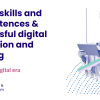Digital Education Action Plan (2021 - 2027)
The Digital Education Action Plan was put forward by the European Commission in October 2020 as an EU-wide strategic vision for achieving high-quality, inclusive and accessible digital education in the period from 2021 to 2027. It also represents a call to action for stronger collaboration between the variety of stakeholders in the European landscape. The Digital Education Action Plan addresses also the impact of the COVID-19 crisis on digital skills and encourages stakeholders to extract good practices from the increased use of technology across contexts to get Europe's education and training systems ready for the digital age.
There are two main strategic priorities, embedded within the Digital Education Action Plan - enabling the development of a high quality digital education ecosystem, and enhancing the digital skills and digital transformation competences for all.
A high-performing digital education ecosystem requires the development of several aspects, including:
- the necessary technical infrastructure to support more education and training practices. going online, improvements in connectivity and availability of digital equipment.
- digital skills amongst teachers, educators and training staff.
- effective digital capacity building, including improvement in organisational digital capabilities.
- the availability of high-quality learning content and secure, private, and ethical standards for online platforms and tools.
The second priority of the Digital Education Action Plan is the enhancement of the digital skills of citizens and businesses, as well as the skills required for the digital transformation. This is why the European Commission is launching a wide range of actions to improve the basic digital skills and competences on all levels, starting from an early age, together with initiatives aiming to support the development of more, diverse, and better trained information and communication technology (ICT) professionals and digital experts. Other actions proposed include:
- European Digital Skills Certificate (EDSC), to be recognised and accepted throughout the EU member states.
- a new European Digital Education Hub, to support national and regional digital skills. initiatives and cross-sector collaboration on issues like accessibility and interoperability.
Through these actions, and many others, the Digital Education Action Plan (2021-2027) aims to support the development of digital skills and skills for the digital transformation and 'reset' education and training in Europe for the digital age.
Council recommendations on successful digital education and improved provision of digital skills and competences
On 23 November 2023, European Council adopted a set of recommendations to drive forward the digital transformation of education and training systems in Europe - and ensure the competences and skills of EU citizens and the labour force are fit for the digital age.
The set of recommendations that the Council put out in November 2023 wants to see EU education system keep up with the times. This means they have to be able to foster future-proof skills and lead forward the twin digital and green transition, rather than adapt to the changing circumstances the new reality brings.
Check our article to find out more about the content of the recommendations.





